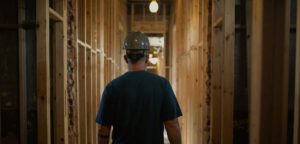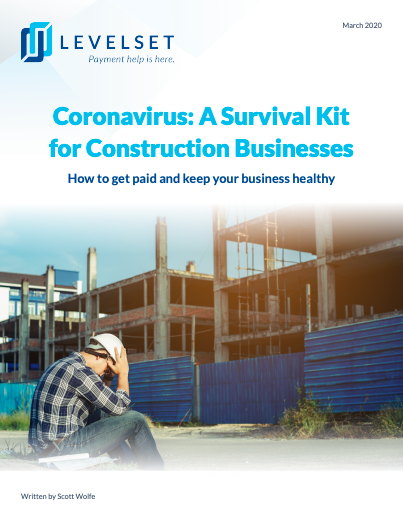
The damage and fallout created by the COVID-19 pandemic with regard to the global construction industry is simply staggering. The European Construction Industry Federation (FIEC) recently requested that the COVID-19 pandemic be deemed a national “force majeure” event by the executive branch of the European Union. If this were to happen, contractors could focus on getting back to actual construction work, once the stay-at-home orders are lifted. Here’s how a federal force majeure measure might work in the US – and the benefits and challenges of implementing one for the construction industry.
What is force majeure?
Force majeure is typically a construction contract clause, which relieves the contractor or subcontractor from their contractual obligation due to certain “uncontrollable acts.” These acts can include natural disasters, labor strikes, acts of war, and potentially pandemic outbreaks. A government measure of force majeure would address all delays and contract breaches caused by COVID-19, for all affected contractors, project owners, and project funders.
The US contractors will be facing nearly identical issues as their European counterparts are now. Unlike many other occupations, contractors cannot work remotely. So virtually every construction project is now dealing with project delays ranging from 30 to 120 days.
A call for EU to declare force majeure
On March 23, 2020, he European Construction Industry Federation (FIEC) published a press release stating that “immediate action by the EU Commission is needed to ensure that COVID-19 is considered a force majeure, to eliminate penalties for companies that have to suspend work; and to increase European funds to cover the increased costs of the work.”
The FIEC asked the European Commission for three actions to support the construction industry:
- Publicly announce, that the COVID-19 pandemic is a case of “Force Majeure” and has to be treated accordingly by all construction employers and clients.
- Warmly recommend to the Members States that they allow the possibility of suspending or reducing ongoing construction, without penalties and taking into consideration damages, for the period necessary, if the responsible contractor is unable to comply with the requested health and safety measures for its workers and/or if he is unable to undertake activities because of disruption in the supply chain or because of the shortage/lack of personnel due to Covid-19. The possibility of waiving delay penalties in public procurement contracts is already mentioned in the Eurogroup statement of 16 March 2020.
- When ongoing construction projects are co-financed by the European Union, immediately allocate specific resources for covering the additional costs generated by the Covid-19 pandemic (extra security of worksites, costs related to changes in organisation and new time schedules on worksites, overheads,…). Encourage the Member States to do the same at national level.
The Cost of COVID-19 for US Contractors
Project delays, of any kind can be extremely expensive for contractors:
- Delays can cause breach of contract issues, resulting in fines and penalties for not hitting milestones or completion date
- Building permits have to be renewed, as they expired due to the work stoppage
- Temporary services (power, lifts, and trash) have to be extended
- Seasonal weather impacts job site access/production
The COVID-19 pandemic has also ushered new jobsite safety standards into place, literally overnight. Since these costs weren’t included within the original contracts, they are being paid for by the contractor. Depending on the size of the project, this expense could easily run into thousands of dollars that can’t be recovered by the contractor.
For every construction project considered essential business that didn’t shut down, a contractor has had to immediately spend money on additional cleaning and hygiene supplies, safety gear, and other expenses to meet local guidelines and requirements.
And as each project re-opens, another contractor will have to start spending money for the same items and the same reasons.
In addition, the production line stoppages will be responsible for material shortages within the next 3-6 months. These shortages will cause prices to go up, and the contractor currently has no recourse to recover these unforeseen costs, either.
The immediate future is looking pretty bleak for the US contractor. Without some relief or protection from enormous potential financial harm, many contractors will be forced to simply close their companies, and just walk away. This is the exact same thing we saw with the Great Recession (2007-09), when countless small to medium sized contractors shut their doors forever.
Benefits of a national force majeure measure
A national force majeure decree would be a huge boon for the US construction industry.
- Without the threat of legal action to deal with on every project, contractors can focus on getting projects back online and moving forward again.
- Additional safety measure costs, as a result of COVID-19 can be recovered.
- Increased material price costs could be recouped by the contractor as well.
In essence, a national declaration of force majeure would simply overwrite the dates of all construction contracts, affected by COVID-19. The lost time is just that, lost time, and it’s nobody’s fault. This would literally allow tradesmen on every project to pick up their tools and go right back to work!
Challenges of national force majeure
The writing and passing of such a measure, is a pretty straight-forward process. As usual, the funding question needs to be answered.
Force majeure would allow contractors to renegotiate contracts to recoup these unforeseen expenses. The question is, would the property owners be willing to renegotiate, knowing that they will have to spend more money?
In the FIEC request, they ask that the EU allocate money to contractors to cover the extra costs associated with the COVID-19 pandemic. If the US federal government provided a funding mechanism for the measure, this would relieve the project owners from ultimately covering these new COVID-19 safety and hygiene costs as well.
There is also the question of enforcement to consider. While most of the US is in lockdown mode, the stay at home orders were issued at the state level, by each governor. This allowed for states to create their own criteria, after considering a variety of factors, such as population density, confirmed cases, and public safety needs. The federal government has only issued recommendations for citizens to follow during the COVID-19 pandemic, so far.
What US force majeure legislation might include
In addition to the “overwrite” of dates of construction contracts affected by COVID-19, there are several other specifics that could be included in a national force majeure declaration. The more of these that can be included, the easier it will be for contractors to go back to work.
Late fees on contractor accounts
Any late fees charged during the work shutdown should be waived on the following;
- Material accounts
- Equipment/vehicle leases and payments
- Office lease or purchase
- Construction loans
- Temporary staffing
Health insurance
All construction workers’ health insurance coverage must remain in effect. No one should be dropped because they didn’t meet the “hours worked criteria”, per the original policy requirements, during the work shutdown.
Unemployment insurance
Since the shutdown forced workers to miss hours during two different reporting quarters, there should be some “adjustment” made with regard to future unemployment insurance (UI) payment calculations. This could be a tricky subject, since each state administers their own UI program and requirements, completely independent of one another.
Could a national force majeure actually work in the US?
Implementing a national force majeure measure for the US construction industry would require that Congress pass a bipartisan piece of legislation quickly. With the republican-controlled Senate, and the democrat-controlled House of Representatives, such a measure would be difficult to put into place.
The second major hurdle to a national measure would come from trying to impose a federal mandate that would impact, and possibly overwrite, some state laws and requirements for both unemployment insurance, and health insurance plans. It would be reasonable to expect a great deal of push back from states, who aren’t fond of the federal government getting involved in their state-run programs, let alone changing their state laws and ordinances, too.
That being said, there have been instances of a federal law superseding state laws before, such as Obamacare, or the national speed limit of 55 mph. And it’s not unusual for state law to supersede a federal law, since many states’ minimum wage requirements now exceed the federal minimum wage standard.
With federal funding in place to cover COVID-19 related costs, states would be more inclined to support and enforce a government force majeure measure. The states would also benefit immensely, since their court systems won’t be flooded with a torrent of legal actions being filed back-and-forth between owners, funders, and contractors over the COVID-19 delays.
So the answer is yes: A national force majeure measure could work for the US construction industry.
But – and there’s always a but – it would require a truly massive bipartisan effort at the federal and state levels to make that happen…which changes the answer from a yes to a definite maybe.


